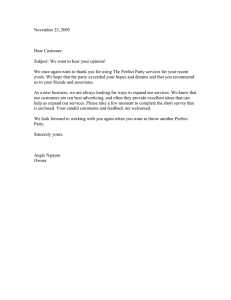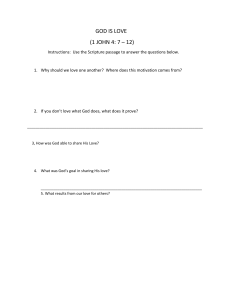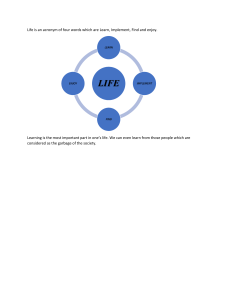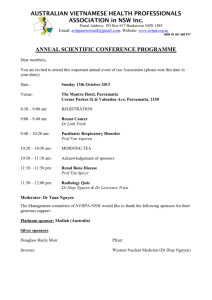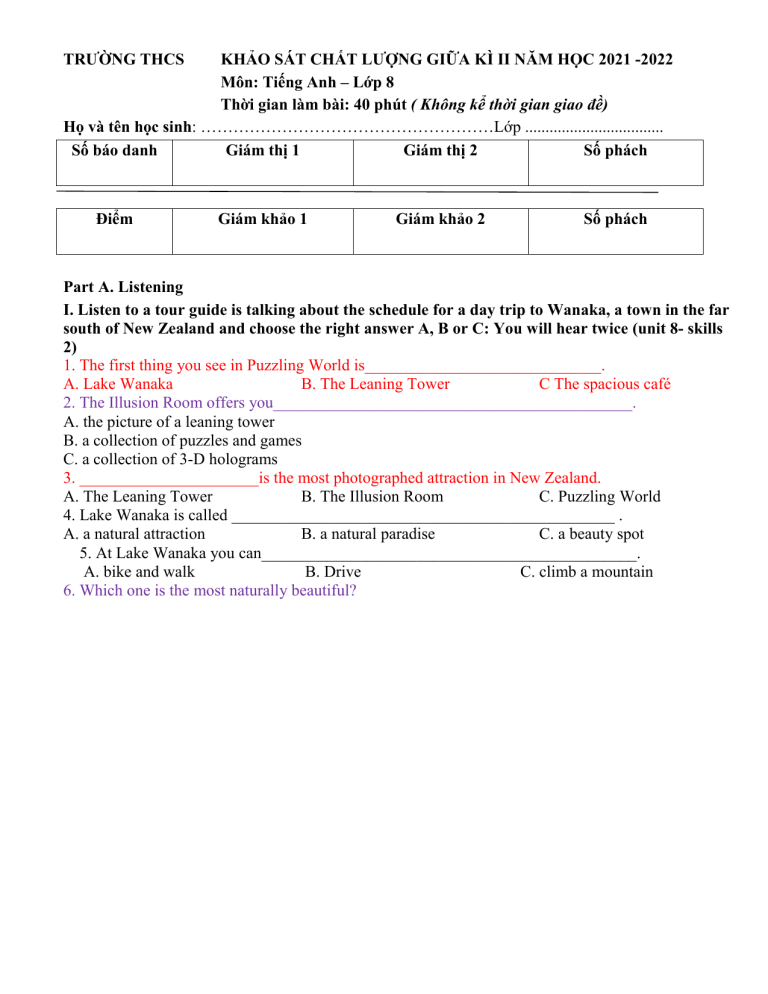
TRƯỜNG THCS KHẢO SÁT CHẤT LƯỢNG GIỮA KÌ II NĂM HỌC 2021 -2022 Môn: Tiếng Anh – Lớp 8 Thời gian làm bài: 40 phút ( Không kể thời gian giao đề) Họ và tên học sinh: ………………………………………………Lớp .................................. Số báo danh Giám thị 1 Giám thị 2 Số phách Điểm Giám khảo 1 Giám khảo 2 Số phách Part A. Listening I. Listen to a tour guide is talking about the schedule for a day trip to Wanaka, a town in the far south of New Zealand and choose the right answer A, B or C: You will hear twice (unit 8- skills 2) 1. The first thing you see in Puzzling World is_____________________________. A. Lake Wanaka B. The Leaning Tower C The spacious café 2. The Illusion Room offers you____________________________________________. A. the picture of a leaning tower B. a collection of puzzles and games C. a collection of 3-D holograms 3. ______________________is the most photographed attraction in New Zealand. A. The Leaning Tower B. The Illusion Room C. Puzzling World 4. Lake Wanaka is called _______________________________________________ . A. a natural attraction B. a natural paradise C. a beauty spot 5. At Lake Wanaka you can______________________________________________. A. bike and walk B. Drive C. climb a mountain 6. Which one is the most naturally beautiful? A. Puzzling World B. Lake Wanaka C. Leaning Tower II. Listen to Nguyen talking with his friend Phong, who has just come back from a visit to Singapore and decide if the sentences are true (T) or false (F). T 1. Phong was told of some environmental rules before he started his tour. 2. People would be fined if they littered. 3. Officers on duty can easily be recognised. 4. You would have to pay $500 if you spat out chewing gum in the street. 5. Singapore uses the radio to tell people what they shouldn't do in public. 6. Both the school and the family are responsible for teaching children how to behave in society. Part B. I. Choose the word which has the underlined part pronounced differently from that of the others. 1. A. places B. cakes C. mates D. plates 2. A. jungle B. luggage C. sunbathe D. sugar 3. A. follow B. powder C. show D. borrow 4. A. wicked B. visited C. laughed D. divided II. Choose the best answer A, B, C or D to complete each sentence. 1. _____ is home to unique animals like the kangaroo and koala. A. England B. America C. Australia D. Singapore 2. If I were you, I _____ earplugs when going to the concert. A. will wear B. wore C. wears D. would wear 3. Ireland……… the Eurovision Song Contest seven times. A. win B. has won C. won D. winning 4. The residents of the street cannot sleep _____ the loud noise from the music club. A. because of B. cause C. lead to D. because 5. Tom: “Most people had moved to safe place areas when the storm broke”. Linda: “_____” F A. Thank you. B. That’s awful. C. That’s a relief. D. Oh no! That’s terrible 6. Many old buildings _______ by the storm last night. A. erupt B. were destroyed C.was erupted D. destroyed 7.The last typhoon resulted ___________ terrible loss of lives. A. in B. on C. for D. of 8. English is the ___________ language of many countries such as the US, the UK, and Australia. A. international B. usual C. popular D. official 9. Poisonous ___________ from factories can kill a lot of wildlife animals. A. things B. animals C. chemicals D. nations 10. People in the flooded area have ___________ to a safer place. A. evacuating B. been evacuated C. evacuated D. evacuate 11. Children look very …………….while playing games during breaktime. A. excited B. exciting C. excite D. excitement III. Read and circle the best option A, B, C or D to complete the passage: There (1).................... many simple things we can do to stop the (2). ...................... of the invironment. First of all, we should not dump our rubbish without (3) ................... which things, such as bottles and paper can be recycled. We should put objectives that we can recycle in (4).. ...................... bins. Secondly, instead of talking our car wherever we go, we ought to leave it at home (5).. .................. possible, and go on foot or by public transport. When we have to drive to the market (6)... ................. our shopping, we should always remember taking our own bags (7).................. we don't need to use the supermarket's plastic bags. 1. A. are B.is C.was D.were 2. A. destroy B. destroyed C.destructive D. destruction 3. A. think B.to think C.thinking D. thought 4. A. recycle B. recycles C. recycled D. recycling 5. A. where B.whenever C.when D. wherever 6. A. to do B. do C. to make D. making 7. A.so B. that C. so that D. so as V. Read the following passage and choose the best answer A, B, C or D: Just a few years ago, this place was called Dumptown. The people living here didn’t think much about where waste went when they threw it out. Things that could be reused or recycled were thrown in the trash, because nobody believed recycling made a difference. And, eventually, that became a very big problem. The garbage heap grew and began to smell. Sometimes it caught fire, and making it hard for everyone to breathe. Dumptowners knew they had to fix it. They learned to reduce the amount of waste they threw them away. For example, they learned to reuse things—like washing out empty jars in - stead of throwing them away. And, they learned to recycle. They set up bins around town to collect glass, paper, and other things, then made into new products. 1. The people living in Dumptown_______. A. didn’t think much about where the waste went B. threw things that could be reused or recycled into the trash C. didn’t believe that recycling could make a difference D. all are correct 2. Which of the following could replace the word ‘trash’ in line 3? A. garbage B. rubbish C. compost D. A & B 3. What were the Dumptown’s problems? A. The garbage heap smelled. B. Sometimes the garbage heap caught fire. C. It was hard for everyone to breathe. D. all are correct 4. What does the word ‘them’ in line 11 refer to? A. the trash B. the garbage heap C. Dumptowners D. empty jars’ 5. What did they do to solve their problems? A. They reduced the amount of waste they threw away. B. They learnt to reuse things. C. They learnt to recycle. D. all are correct 6. What can we learn from the passage? A. We shouldn’t think much about waste B. We should find solution for our waste C.We should set up bins around town to collect glass, paper D. We should make it easy for everyone to breath VI: One of the four underlined parts marked A, B, C, D in each sentence is not correct. 1. If Lucia had been here now, she would find out the truth about her uncle’s accident. A B C D 2.If it did rain, Peter would pay us a visit. A B C D 3. If I had knew the time when the match started, I would have told you. A B C D VII. Rearrange the words to make meaningful sentences 1. she / at home/was /yessterday. ……………………………………………………………………………………………….. 2. They /anything/haven’t/ since 2 o’clock./eaten ………………………………………………………………………………………………… 3. If/ were /I/ study/ harder./ you/ would/I ……………………………………………………………………………………………….. VIII. Rewrite the sentences so that they have the same meaning as the ones given 1. He can’t go out because he has to study for his exam. => If…………………………………………………………………………………… 2. She is lazy so she can’t pass the exam. If………………………………………………………………………………….…… 3. Somebody has taken my briefcase. My briefcase ……………………………………………………………………………… 4 She has has finished her report already Her report …………………………………………………………………………………. ANSWER KEY I. Listen to the passage and choose the correct answer. 1. B 2. C 3. C 4. B 5. A 6.B II. Listen to Nguyen talking with his friend Phong, who has just come back from a visit to Singapore and decide if the sentences are true (T) or false (F). 1. T 2. T 3. F 4. F 5. F 6. T Part B. I. Choose the word which has the underlined part pronounced differently from that of the others. 1. A 2. D 3. B 4. D II. Choose the best answer A, B, C or D to complete each sentence. 1. C 2. D 3.B 4. A 5. C 6. B 7. A 8. D 9. C 10. B 11. A III. Read and circle the best option A, B, C or D to complete the passage: 1. A 2. D 3. C 4. D 5.B 6. A 7. C IV. Read the passage and choose the item(A, B, C or D) that best answers each of the questions about it. 1.B 2. D 3. C 4. D 5. D 6. C V. Read the following passage and choose the best answer A, B, C or D: 1.A 2.D 3. D 4. A 5. D 6. B 1. A 2. B 3. B VI: One of the four underlined parts marked A, B, C, D in each sentence is not correct. 1. A 2. B 3. B VII. Rearrange the words to make meaningful sentences 1. She was at home yesterday. 2. They haven’t eaten anything since 2o’clock. 3. If I were you I would study harder VIII. Rewrite the sentences so that they have the same meaning as the ones given 4. If he didn’t have to study for his exam, he could go out. 5. If she wasn’t lasy she could pass the exam 6. My briefcase has been taken. 7. Her report has been reported. Audio script: Good morning. I hope you all had a good sleep. We are now heading for Wanaka. We arrive at the first destination, Puzzing World at 9.30. The first puzzling thing which welcomes you is the Leaning Tower. When you get inside the spacious café, you will find yourself among various wooden puzzles and games. The Illusion Room is must-see as there’s nothing else like it in the world. Puzzling World is possibly the most photographed attraction in New Zealand. At 12.30 we leave for Lake Wanaka, New Zealand’s fourth largest lake. This natural paradise’ has something for everyone. Adventure lovers may follow the biking and walking tracks through the park. Relaxation seekers may stay by the lake, taking a boat ride, or just sitting and watching its changing beauty. We meet up at 4 o’clock and the bus leaves at exactly 4.15. I hope... Audio script: Nguyen: Is Singapore really as clean as it’s advertised? Phong: Yes, it is. Nguyen: How can they do that? Phong: They have a very strict policy on keeping the environment clean. Before we started our tour, the tour guide warned us that we could be fined or arrested for spitting or littering. Nguyen: But how would they know? Phong: There are hundreds of officers in plain clothes. Their job is to blend into the crowd and spot anyone who breaks the law. Nguyen: What would happen if you did break the law? Phong: Well, for example, if you spat out your chewing gum in the street, you would be fined two hundred dollars. Nguyen: Really? But how could you know about it? Phong: There are posters in public places to tell people what they should or shouldn’t do. Nguyen: That’s a good idea. Phong: And from a young age, children are taught how to behave at school and in the family. Nguyen: Habits start early, right? Phong: Yes. Once you’ve learnt them, they become lifetime habits.
